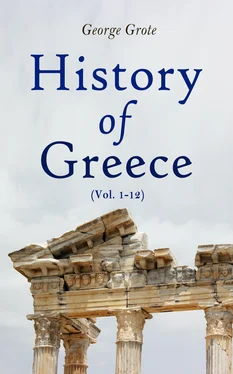George Grote - History of Greece (Vol. 1-12)
Здесь есть возможность читать онлайн «George Grote - History of Greece (Vol. 1-12)» — ознакомительный отрывок электронной книги совершенно бесплатно, а после прочтения отрывка купить полную версию. В некоторых случаях можно слушать аудио, скачать через торрент в формате fb2 и присутствует краткое содержание. Жанр: unrecognised, на английском языке. Описание произведения, (предисловие) а так же отзывы посетителей доступны на портале библиотеки ЛибКат.
- Название:History of Greece (Vol. 1-12)
- Автор:
- Жанр:
- Год:неизвестен
- ISBN:нет данных
- Рейтинг книги:5 / 5. Голосов: 1
-
Избранное:Добавить в избранное
- Отзывы:
-
Ваша оценка:
- 100
- 1
- 2
- 3
- 4
- 5
History of Greece (Vol. 1-12): краткое содержание, описание и аннотация
Предлагаем к чтению аннотацию, описание, краткое содержание или предисловие (зависит от того, что написал сам автор книги «History of Greece (Vol. 1-12)»). Если вы не нашли необходимую информацию о книге — напишите в комментариях, мы постараемся отыскать её.
History of Greece (Vol. 1-12) — читать онлайн ознакомительный отрывок
Ниже представлен текст книги, разбитый по страницам. Система сохранения места последней прочитанной страницы, позволяет с удобством читать онлайн бесплатно книгу «History of Greece (Vol. 1-12)», без необходимости каждый раз заново искать на чём Вы остановились. Поставьте закладку, и сможете в любой момент перейти на страницу, на которой закончили чтение.
Интервал:
Закладка:
It was the practice to offer to the gods in sacrifice the bones of the victim only, inclosed in fat: how did this practice arise? The author of the Hesiodic Theogony has a story which explains it: Promêtheus tricked Zeus into an imprudent choice, at the period when the gods and mortal men first came to an arrangement about privileges and duties (in Mekônê). Promêtheus, the tutelary representative of man, divided a large steer into two portions: on the one side he placed the flesh and guts, folded up in the omentum and covered over with the skin: on the other, he put the bones enveloped in fat. He then invited Zeus to determine which of the two portions the gods would prefer to receive from mankind. Zeus “with both hands” decided for and took the white fat, but was highly incensed on finding that he had got nothing at the bottom except the bones. 144Nevertheless the choice of the gods was now irrevocably made: they were not entitled to any portion of the sacrificed animal beyond the bones and the white fat; and the standing practice is thus plausibly explained. 145I select this as one amongst a thousand instances to illustrate the genesis of legend out of religious practices. In the belief of the people, the event narrated in the legend was the real producing cause of the practice: but when we come to apply a sound criticism, we are compelled to treat the event as existing only in its narrative legend, and the legend itself as having been, in the greater number of cases, engendered by the practice,—thus reversing the supposed order of production.
In dealing with Grecian mythes generally, it is convenient to distribute them into such as belong to the Gods and such as belong to the Heroes, according as the one or the other are the prominent personages. The former class manifests, more palpably than the latter, their real origin, as growing out of the faith and the feelings, without any necessary basis, either of matter of fact or allegory: moreover, they elucidate more directly the religion of the Greeks, so important an item in their character as a people. But in point of fact, most of the mythes present to us Gods, Heroes and Men, in juxtaposition one with the other and the richness of Grecian mythical literature arises from the infinite diversity of combinations thus opened out; first by the three class-types, God, Hero, and Man; next by the strict keeping with which each separate class and character is handled. We shall now follow downward the stream of mythical time, which begins with the Gods, to the Heroic legends, or those which principally concern the Heroes and Heroines; for the latter were to the full as important in legend as the former.
CHAPTER II.
LEGENDS RELATING TO HEROES AND MEN.
Table of Contents
The Hesiodic theogony gives no account of anything like a creation of man, nor does it seem that such an idea was much entertained in the legendary vein of Grecian imagination; which commonly carried back the present men by successive generations to some primitive ancestor, himself sprung from the soil, or from a neighboring river or mountain, or from a god, a nymph, etc. But the poet of the Hesiodic “Works and Days” has given us a narrative conceived in a very different spirit respecting the origin of the human race, more in harmony with the sober and melancholy ethical tone which reigns through that poem. 146
First (he tells us) the Olympic gods made the golden race,—good, perfect, and happy men, who lived from the spontaneous abundance of the earth, in ease and tranquillity like the gods themselves: they suffered neither disease nor old age, and their death was like a gentle sleep. After death they became, by the award of Zeus, guardian terrestrial dæmons, who watch unseen over the proceedings of mankind—with the regal privilege of dispensing to them wealth, and taking account of good and bad deeds. 147
Next, the gods made the silver race,—unlike and greatly inferior, both in mind and body, to the golden. The men of this race were reckless and mischievous towards each other, and disdainful of the immortal gods, to whom they refused to offer either worship or sacrifice. Zeus in his wrath buried them in the earth: but there they still enjoy a secondary honor, as the Blest of the under-world. 148
Thirdly, Zeus made the brazen race, quite different from the silver. They were made of hard ash-wood, pugnacious and terrible; they were of immense strength and adamantine soul, nor did they raise or touch bread. Their arms, their houses, and their implements were all of brass: there was then no iron. This race, eternally fighting, perished by each other’s hands, died out, and descended without name or privilege to Hadês. 149
Next, Zeus made a fourth race, far juster and better than the last preceding. These were the Heroes or demigods, who fought at the sieges of Troy and Thêbes. But this splendid stock also became extinct: some perished in war, others were removed by Zeus to a happier state in the islands of the Blest. There they dwell in peace and comfort, under the government of Kronos, reaping thrice in the year the spontaneous produce of the earth. 150
The fifth race, which succeeds to the Heroes, is of iron: it is the race to which the poet himself belongs, and bitterly does he regret it. He finds his contemporaries mischievous, dishonest, unjust, ungrateful, given to perjury, careless both of the ties of consanguinity and of the behests of the gods: Nemesis and Ædôs (Ethical Self-reproach) have left earth and gone back to Olympus. How keenly does he wish that his lot had been cast either earlier or later! 151This iron race is doomed to continual guilt, care, and suffering, with a small infusion of good; but the time will come when Zeus will put an end to it. The poet does not venture to predict what sort of race will succeed.
Such is the series of distinct races of men, which Hesiod, or the author of the “Works and Days,” enumerates as having existed down to his own time. I give it as it stands, without placing much confidence in the various explanations which critics have offered. It stands out in more than one respect from the general tone and sentiment of Grecian legend: moreover the sequence of races is neither natural nor homogeneous,—the heroic race not having any metallic denomination, and not occupying any legitimate place in immediate succession to the brazen. Nor is the conception of the dæmons in harmony either with Homer or with the Hesiodic theogony. In Homer, there is scarcely any distinction between gods and dæmons, while the gods are stated to go about and visit the cities of men in various disguises for the purpose of inspecting good and evil proceedings. 152But in the poem now before us, the distinction between gods and dæmons is generic. The latter are invisible tenants of earth, remnants of the once happy golden race whom the Olympic gods first made: the remnants of the second or silver race are not dæmons, nor are they tenants of earth, but they still enjoy an honorable posthumous existence as the Blest of the under-world. Nevertheless the Hesiodic dæmons are in no way authors or abettors of evil: on the contrary, they form the unseen police of the gods, for the purpose of repressing wicked behavior in the world.
We may trace, I think, in this quintuple succession of earthly races, set forth by the author of the “Works and Days,” the confluence of two veins of sentiment, not consistent one with the other, yet both coëxisting in the author’s mind. The drift of his poem is thoroughly didactic and ethical: though deeply penetrated with the injustice and suffering which darken the face of human life, he nevertheless strives to maintain, both in himself and in others, a conviction that on the whole the just and laborious man will come off well, 153and he enforces in considerable detail the lessons of practical prudence and virtue. This ethical sentiment, which dictates his appreciation of the present, also guides his imagination as to the past. It is pleasing to him to bridge over the chasm between the gods and degenerate man, by the supposition of previous races,—the first altogether pure, the second worse than the first, and the third still worse than the second; and to show further how the first race passed by gentle death-sleep into glorious immortality; how the second race was sufficiently wicked to drive Zeus to bury them in the under-world, yet still leaving them a certain measure of honor; while the third was so desperately violent as to perish by its own animosities, without either name or honor of any kind. The conception of the golden race passing after death into good guardian dæmons, which some suppose to have been derived from a comparison with oriental angels, presents itself to the poet partly as approximating this race to the gods, partly as a means of constituting a triple gradation of post-obituary existence, proportioned to the character of each race whilst alive. The denominations of gold and silver, given to the first two races, justify themselves, like those given by Simonidês of Amorgos and by Phokylidês to the different characters of women, derived from the dog, the bee, the mare, the ass, and other animals; and the epithet of brazen is specially explained by reference to the material which the pugnacious third race so plentifully employed for their arms and other implements.
Читать дальшеИнтервал:
Закладка:
Похожие книги на «History of Greece (Vol. 1-12)»
Представляем Вашему вниманию похожие книги на «History of Greece (Vol. 1-12)» списком для выбора. Мы отобрали схожую по названию и смыслу литературу в надежде предоставить читателям больше вариантов отыскать новые, интересные, ещё непрочитанные произведения.
Обсуждение, отзывы о книге «History of Greece (Vol. 1-12)» и просто собственные мнения читателей. Оставьте ваши комментарии, напишите, что Вы думаете о произведении, его смысле или главных героях. Укажите что конкретно понравилось, а что нет, и почему Вы так считаете.












